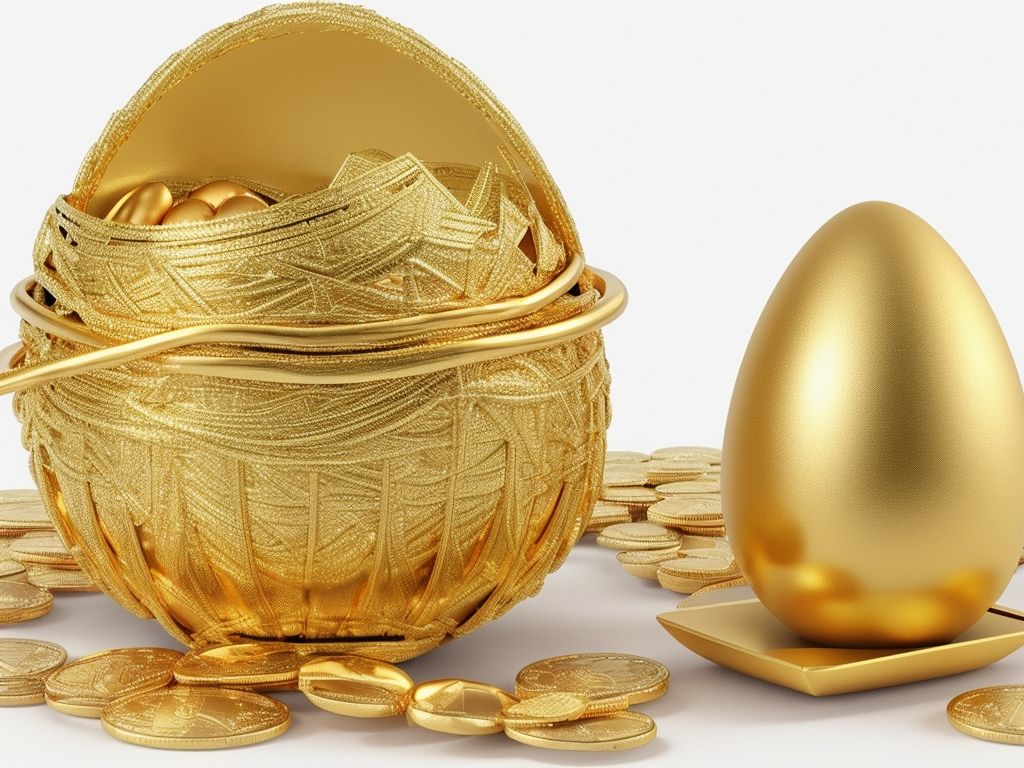Gold IRAs, also known as self-directed individual retirement accounts, are retirement investment vehicles that allow individuals to hold physical gold and other precious metals as part of their retirement portfolio. In an uncertain economic climate and with the potential risks of inflation, many individuals are considering gold IRAs as a future-proof retirement strategy. This article will explore the concept of gold IRAs, the impact of inflation on retirement savings, why gold is considered a good strategy against inflation, how to include gold in your IRA, and the importance of crafting a future-proof retirement strategy that includes diversification with gold. By understanding these key factors, individuals can make informed decisions to secure their retirement and protect their savings against inflationary trends.
Key takeaway:
- Gold IRAs provide a future-proof retirement strategy: Investing in a Gold IRA can help safeguard your retirement savings against the negative impact of inflation.
- Understanding the effects of inflation on retirement savings: Inflation erodes the purchasing power of money over time, making it crucial to consider investments like gold that have historically performed well during inflationary periods.
- Including gold in your IRA: Learn the steps to establish a Gold IRA and choose the right gold IRA custodian to effectively diversify your retirement portfolio and mitigate inflation risk.
What is a Gold IRA?
A Gold IRA, also known as a Gold Individual Retirement Account, is a specialized type of retirement account that enables individuals to invest in precious metals, particularly gold. Unlike traditional IRAs, which mainly focus on investments in stocks and bonds, a Gold IRA allows individuals to hold physical gold coins or bars within the account.
One major advantage of a Gold IRA is its ability to serve as a hedge against economic uncertainties and market downturns. While conventional financial assets can be extremely volatile during times of economic uncertainty, gold has a long history of being regarded as a safe haven asset. It has consistently maintained its value and, in some cases, even witnessed price increases during times of financial instability.
By including gold in an IRA, individuals can effectively reduce their exposure to risk and safeguard their retirement savings from potential financial crises. The historical performance of gold during periods of inflation has also been quite favorable. Past data indicates that gold has often retained its value or even experienced an increase in purchasing power when faced with high inflation.
Furthermore, investing in a Gold IRA can offer individuals certain tax advantages. The Internal Revenue Service (IRS) permits specific types of gold coins, such as American Eagle proof coins and Canadian Maple Leaf coins, to be held in an IRA without any associated taxes on the gains until retirement.
To summarize, a Gold IRA presents individuals with the opportunity to diversify their retirement portfolios by incorporating precious metals like gold. By including gold as part of their investment strategy, individuals can potentially enhance their retirement savings and safeguard their financial future against economic uncertainties.
Why Consider a Gold IRA for Retirement?
When considering why to choose a gold IRA for retirement, there are several factors to keep in mind:
- Protection against economic uncertainties: A gold IRA can serve as a hedge against economic uncertainties and potential financial crises. Gold, historically considered a safe haven asset in times of economic turmoil, provides protection.
- Diversification of retirement portfolio: Including gold in your IRA can help diversify your retirement portfolio beyond traditional financial assets such as stocks and bonds. This diversification reduces the risk of market downturns and adds stability.
- Tax advantages: Gold IRAs offer certain tax advantages that can be beneficial for retirement planning. For example, contributions to a Roth IRA are made with after-tax dollars, but withdrawals in retirement are tax-free.
- Potential for long-term growth: Gold has demonstrated the potential for long-term growth and wealth protection. During inflationary periods, gold has historically performed well and maintained its value.
- Risk reduction: Investing in precious metals like gold can help protect your nest egg from the effects of inflation. Gold has the potential to retain its value and purchasing power over time, reducing risk.
Considering why to choose a gold IRA for retirement can provide protection, diversification, tax advantages, potential growth, and risk reduction. It is important to carefully evaluate your investment goals and consult with a financial professional to determine if a gold IRA is the right choice for your retirement strategy.
Inflation and Its Impact on Retirement

Photo Credits: Www.Mfea.Com by Juan Smith
Inflation and Its Impact on Retirement
Inflation has a significant impact on retirement savings and planning. It is important to understand the effects of inflation in order to craft a future-proof retirement strategy.
1. Reduced purchasing power: Inflation erodes the value of money over time, making goods and services more expensive. This can greatly affect retirees who rely on fixed incomes, as their purchasing power decreases.
2. Increased living expenses: Inflation leads to rising living costs, such as housing, healthcare, and daily expenses. Retirees may find it challenging to meet their basic needs and maintain their desired standard of living.
3. Decreased investment returns: Inflation can negatively impact investment returns, especially on low-risk assets like bonds or savings accounts. The returns earned may not keep pace with inflation, resulting in a diminishing real rate of return on investments.
4. Necessary adjustments: To counter the impact of inflation, retirees may need to regularly review and adjust their retirement plan. This may include considering investments with higher potential returns, diversifying portfolios, or implementing strategies to protect against inflation.
5. Longevity risk: Inflation can pose a threat to the longevity of retirement savings. As the cost of living increases, retirees need to ensure their savings last for a longer period to sustain their lifestyle.
6. Social Security benefits: Social Security benefits may be adjusted to account for inflation through cost-of-living adjustments (COLAs). These adjustments may not fully compensate for the rising cost of living, making it essential to have additional income sources.
7. Healthcare expenses: Inflation can significantly impact healthcare expenses, which tend to rise at a faster rate than general inflation. Retirees should consider the potential impact of healthcare costs on their retirement savings and plan accordingly.
For more information on crafting a future-proof retirement strategy, including the use of Gold IRAs, click here.
Understanding the impact of inflation on retirement is crucial for developing a comprehensive and effective retirement strategy. By considering inflation and its potential consequences, retirees can make informed decisions and take appropriate measures to protect their financial well-being.
Understanding the Effects of Inflation
Inflation is a critical factor that can significantly impact retirement savings. It is essential to comprehend the effects of inflation to effectively plan and prepare for a secure retirement.
Understanding the effects of inflation on savings and investments is crucial when planning for retirement. By comprehending the impact of inflation, individuals can adjust their financial goals accordingly. Incorporating inflation into financial planning ensures that enough savings are accumulated to uphold the desired lifestyle during retirement.
One of the effects of inflation on retirement savings is the gradual erosion of purchasing power. If the inflation rate surpasses the rate of return on investments, the value of savings will decline over time. Consequently, this could lead to a decreased standard of living during retirement.
Furthermore, inflation can affect the cost of living. In an inflationary environment, everyday expenses like housing, healthcare, and basic necessities tend to become more expensive. Failing to adequately plan for this can strain retirement income.
To counter the adverse effects of inflation, financial experts recommend diversifying retirement portfolios with safe haven assets such as precious metals. Historical data suggests that assets like gold perform well during periods of inflation and can serve as a hedge against economic uncertainties. Including gold in an IRA can help mitigate the risk of inflation eroding the value of retirement savings.
Overall, a good understanding of the effects of inflation is vital for a secure retirement. By considering and incorporating strategies like investing in precious metals, individuals can create a future-proof retirement plan that safeguards their nest eggs from the erosive impact of inflation.
How Inflation Affects Retirement Savings?
How Inflation Affects Retirement Savings?
Inflation can have a significant impact on retirement savings. Here are a few ways inflation affects retirement savings:
- Reduced purchasing power: As prices increase due to inflation, the value of money decreases over time. This means that the money you saved for retirement may not be enough to cover your expenses in the future.
- Increased cost of living: Inflation leads to a higher cost of living, making it more expensive to maintain the same standard of living during retirement. This can put a strain on your retirement savings and decrease your financial stability.
- Eroded savings returns: Inflation erodes the real returns on your investments. If the rate of return on your investments is lower than the inflation rate, your savings may not keep up with the rising costs, resulting in a loss of purchasing power.
- Longevity risk: Inflation is a particular concern for retirees who are living longer. The longer you live, the more impact inflation will have on your retirement savings. It is essential to plan for potential inflationary periods to ensure your savings last throughout your retirement years.
To illustrate the impact of inflation on retirement savings, consider the story of Susan. Susan retired with a fixed income and a modest retirement savings. Over time, inflation caused the cost of living to rise significantly. As a result, Susan struggled to cover her expenses with her fixed income, and her savings were quickly depleted. This left her financially vulnerable and unable to enjoy the retirement lifestyle she had envisioned.
Understanding how inflation affects retirement savings is crucial for crafting a future-proof retirement strategy. By considering inflation and taking steps such as investing in assets that can hedge against economic uncertainties like precious metals, individuals can mitigate the negative impact of inflation on their retirement savings.
Why Gold is a Good Strategy Against Inflation

Photo Credits: Www.Mfea.Com by Christopher Lopez
Gold is a good strategy against inflation for several reasons.
Gold has historically proven to be a store of value. That’s why gold is a good strategy against inflation. When inflation occurs and the value of currency decreases, the price of gold tends to rise. This is because gold is a tangible asset that holds its worth over time.
Gold is a global currency that is not subject to the policies and fluctuations of individual countries. This makes it a reliable hedge against inflation, which is why gold is considered a good strategy. It is not affected by monetary policies or economic conditions of any specific country.
Gold has limited supply and is not easily produced. This scarcity factor contributes to its value and makes it an effective strategy against inflation. When the supply of currency increases, the value of each unit decreases, but gold maintains its scarcity and value, making it a good strategy against inflation.
In addition, gold is a tangible asset that can be physically held. This provides a sense of security and protection against inflation, which is why gold is considered a good strategy. It is not subject to the risks associated with digital assets or paper investments.
Gold has a long history of being considered a safe haven investment during times of economic uncertainty. That’s why gold is a good strategy against inflation. During periods of high inflation or economic crisis, investors often turn to gold as a reliable store of value, further reinforcing its effectiveness against inflation.
Fact: During the 1970s, a period of high inflation in the United States, the price of gold increased by over 100%, showing its potential as a strategy against inflation.
The Historical Performance of Gold During Inflationary Periods
During inflationary periods, the historical performance of gold has been remarkable. Gold has consistently demonstrated its ability to maintain its value and even increase in price during times of inflation.
Historically, the price of gold has risen when inflation rates have risen. For example, during the high inflation period in the 1970s, the price of gold increased by over 400%. This demonstrates that gold serves as a reliable hedge against inflation and can act as a store of value when the purchasing power of traditional currencies is eroded.
The reason behind gold’s strong performance during inflationary periods lies in its status as a safe haven asset. Investors often turn to gold as a safe haven during times of economic uncertainty and inflation, as it is considered a tangible and valuable asset that is not easily affected by market downturns.
Gold has a limited supply, making it a scarce resource. This scarcity, combined with its historical significance and demand for jewelry and industrial purposes, contributes to its value during inflationary periods.
It is important to note that while gold has shown a strong historical performance during inflationary periods, it is still subject to market volatility and fluctuations. Therefore, it is advisable to consider gold as part of a diversified investment portfolio that aligns with your investment goals and risk tolerance.
Fact: During the most recent inflationary period, from 2007 to 2009, the price of gold rose by over 70%, highlighting its ability to protect investors’ purchasing power during times of economic uncertainty.
How Does Gold Protect Against Inflation?
Gold protects against inflation by maintaining its value during periods of economic uncertainty. Here’s how gold acts as a hedge against inflation and protects against inflation.
-
Preserving purchasing power: Gold has historically maintained its value over time, making it a reliable store of wealth. Unlike paper assets, which can be affected by inflation, gold retains its purchasing power.
-
Limited supply: Gold, a precious metal with a finite supply, tends to increase in value during inflationary times when there is a higher demand for safe-haven assets.
-
Inflation hedge: Inflation results in the decrease of paper currency value, leading to higher prices for goods and services. However, investing in gold can help protect against this loss of value as it acts as a hedge.
-
Diversification: Including gold in a retirement portfolio offers diversification. Gold has a low correlation with traditional financial assets like stocks and bonds, which reduces risk by providing an alternative investment that behaves differently during market downturns.
-
Tangible asset: Unlike paper assets, gold is a physical asset, providing reassurance and stability during economic uncertainty.
Taking these factors into account, investors can understand how gold’s qualities make it a valuable tool in protecting against inflation and maintaining the value of their retirement savings.
How to Include Gold in your IRA

Photo Credits: Www.Mfea.Com by Dennis Baker
Crafting a future-proof retirement strategy requires knowing how to include gold in your IRA. Discover the key steps to establish a gold IRA and how to choose the right gold IRA custodian. With the potential impacts of inflation trends in mind, these insights will empower you to make informed decisions for a secure and prosperous retirement. No more uncertainties, let’s dive into the world of gold IRAs and maximize your financial future.
Steps to Establish a Gold IRA
Establishing a Gold IRA involves following a series of steps to ensure a smooth and secure process:
- Research: Begin by educating yourself about the benefits of Gold IRAs and how they can help you. Gain knowledge about the tax advantages, the potential hedge in times of financial crisis, and the protection against economic uncertainties that come with investing in gold.
- Choose an IRA Custodian: Select a reputable and experienced custodian to handle your Gold IRA. Look for a custodian that specializes in precious metals and possesses a proven track record. Take into account factors such as fees, storage options, and customer service.
- Open an Account: Once you have chosen a custodian, go through their process for opening a Gold IRA account. Provide the necessary documentation and complete any required paperwork. Make sure you fully comprehend the terms and conditions of the account.
- Fund Your Account: Transfer funds from your existing retirement account to your new Gold IRA. This can typically be done through a direct rollover or transfer. Seek guidance from your custodian to ensure the proper handling of the funds.
- Select Gold Investments: Collaborate with your custodian to select gold investments that align with your investment goals. Consider options such as gold coins, like American Eagle proof coins or Canadian Maple Leaf coins, as well as other valuable metals.
- Purchase the Gold: Once you have made your decisions on the gold investments, instruct your custodian to purchase the chosen gold on your behalf. They will handle the transaction and ensure the proper storage and security of the gold.
- Maintain and Monitor: Regularly assess the performance of your Gold IRA and keep yourself informed about market trends. If necessary, consider consulting with a financial advisor to optimize your investment strategy.
By following these steps, you can establish a Gold IRA and reap the benefits that come with investing in precious metals for your retirement.
Choosing the Right Gold IRA Custodian
When it comes to choosing the right gold IRA custodian, there are several factors to consider:
- Experience and Reputation: Look for a custodian with a proven track record in handling precious metals. Consider their years of experience and check for any positive reviews or testimonials.
- Custodial Services: Ensure that the custodian offers all the necessary services for managing your gold IRA. This should include secure storage, insurance coverage, account administration, and easy accessibility to your precious metals.
- Fees and Pricing: Compare the fees charged by different custodians. Look for transparency in their fee structure and make sure you understand all the costs involved. Avoid custodians with hidden fees or high commissions.
- IRA Eligibility: Verify that the custodian is approved by the IRS to handle self-directed IRAs. They should be knowledgeable about IRS rules and regulations concerning gold IRAs.
- Storage Facilities: Find out where the custodian stores the gold and what security measures they have in place. Look for facilities that are fully insured and provide segregated storage to ensure the safety of your assets.
- Customer Service: Consider the level of customer support provided by the custodian. Look for responsive and knowledgeable representatives who can answer your questions and provide timely assistance.
By carefully evaluating these factors and comparing different custodians, you can choose the right gold IRA custodian that aligns with your investment goals and provides the necessary security and support for your retirement savings.
Crafting a Future-Proof Retirement Strategy

Photo Credits: Www.Mfea.Com by Nicholas Wright
Crafting a future-proof retirement strategy means making informed decisions about diversifying your retirement portfolio with gold and considering the pros and cons of a gold IRA. Discover the potential benefits and risks associated with incorporating gold into your investment strategy, ensuring a secure and reliable foundation for your retirement savings. With an ever-changing economic landscape, understanding these sub-sections will empower you to make the most informed choices for your financial future.
Diversifying Your Retirement Portfolio with Gold
Diversifying your retirement portfolio with gold can provide several benefits and help protect your savings against economic uncertainties. Here are some important points to consider:
- Protection against market downturns: Gold, when included in your retirement portfolio, has historically been seen as a safe haven asset during times of market volatility. It has the potential to retain its value or even increase when other conventional financial assets decline.
- Hedging against inflation: By diversifying your portfolio with gold, you can benefit from its ability to act as a hedge against inflation. When the value of paper assets such as currency decreases due to inflation, the price of gold often rises, preserving the purchasing power of your savings.
- Risk reduction: Adding gold to your retirement portfolio can help reduce risk by diversifying your investments. By including assets that have a low correlation to traditional investments like stocks and bonds, such as gold, you can potentially mitigate losses in one area with gains in another.
- Tax advantages: Investing in gold within an IRA, such as a traditional IRA or a Roth IRA, can offer tax advantages. It’s important to consult with a financial advisor or tax professional to understand the specific tax implications and benefits of including gold in your retirement portfolio.
- Long-term performance: Over longer periods, diversifying your retirement portfolio with gold has shown the potential for growth and stability. While short-term fluctuations may occur, gold has historically preserved its value and demonstrated resilience in times of economic uncertainty.
By diversifying your retirement portfolio with gold, you can potentially enhance the overall stability and performance of your investments, and better prepare for a secure financial future.
Considering the Pros and Cons of a Gold IRA
When considering the pros and cons of a Gold IRA, it is important to carefully evaluate your risk tolerance, investment goals, and financial situation before deciding to invest. It is essential to weigh the advantages and disadvantages to determine if a Gold IRA aligns with your investment goals and retirement strategy.
| Advantages | Disadvantages |
| 1. Hedge against economic uncertainties: Gold has historically been considered a safe haven asset during times of market downturns and potential financial crisis. | 1. Lower returns compared to other investment options: Gold may not provide the same level of potential returns as traditional financial assets like stocks or mutual funds. |
| 2. Protection against inflation: Gold has shown a historical performance of preserving wealth during inflationary periods. | 2. Lack of income generation: Unlike other investment options, gold does not generate regular income, which may be a disadvantage for investors looking for cash flow. |
| 3. Diversification: Including gold in your IRA can help reduce risk by diversifying your portfolio beyond conventional financial assets. | 3. Storage and security: Physical gold coins or bars may require additional security measures and storage, which can lead to additional costs. |
| 4. Tax advantages: Gold IRAs offer potential tax advantages, such as tax-deferred growth or tax-free withdrawals in the case of a Roth IRA. | 4. Market volatility: The price of gold can be subject to significant price fluctuations and volatility, which may not be suitable for all investors. |
To determine if a Gold IRA is suitable for you, it is crucial to consider the pros and cons mentioned above. Carefully evaluate your risk tolerance, investment goals, and financial situation. While a Gold IRA can provide benefits such as protection against inflation and diversification, it may not be suitable for everyone due to its lower potential returns and lack of regular income generation.
Some Facts About Gold IRAs and Inflation Trends: Crafting a Future-Proof Retirement Strategy:
- ✅ Gold and silver are considered safe-haven assets that can protect portfolios during times of economic uncertainty. (Source: Our Team)
- ✅ Investing in a Gold IRA allows individuals to include physical gold, silver, platinum, and palladium in their retirement investment portfolio. (Source: Our Team)
- ✅ Gold and silver have historically served as effective hedges against inflation and market downturns. (Source: Our Team)
- ✅ Gold has a psychological advantage for investors due to its reputation as a safe haven and an inflation hedge. (Source: Our Team)
- ✅ Silver’s industrial demand, including its use in solar panels, adds to its appeal as an investment option. (Source: Our Team)
Frequently Asked Questions
What are the tax benefits of investing in a Gold IRA?
Investing in a Gold IRA provides tax benefits such as making pre-tax contributions and reducing taxable income. Additionally, taxes on gains can be deferred until liquidation for traditional IRAs, and taxes are only paid on contributions for Roth IRAs.
How does a Gold IRA help with secure wealth accumulation?
A Gold IRA allows individuals to include physical gold and other approved precious metals in their retirement investment portfolio. Gold has a reputation as a safe haven and an inflation hedge, making it an attractive long-term investment option for secure wealth accumulation.
Are there any required distributions associated with Roth IRAs?
No, there are no required distributions associated with Roth IRAs during your lifetime. This allows individuals to maintain control over their investments and potentially maximize their retirement savings.
What is the role of fiat currencies in gold IRAs?
Fiat currencies, which are government-issued currencies that are not backed by a physical commodity like gold, can be subject to inflation and economic uncertainty. Gold IRAs provide a way for investors to mitigate the risks associated with fiat currencies by holding physical precious metals.
Is investing in a Gold IRA suitable for inexperienced investors?
No, investing in a Gold IRA is designed for experienced investors who are well-versed in buying and selling physical precious metals. It is important for individuals to thoroughly research and understand the risks and potential benefits before making any investment decisions.
What are some gold & silver investment companies that offer Gold IRAs?
There are several reputable gold & silver investment companies that offer Gold IRAs, such as American Hartford Gold, Birch Gold Group, and Augusta Precious Metals. These companies can provide comprehensive comparison and guidance for individuals interested in investing in gold IRAs.
